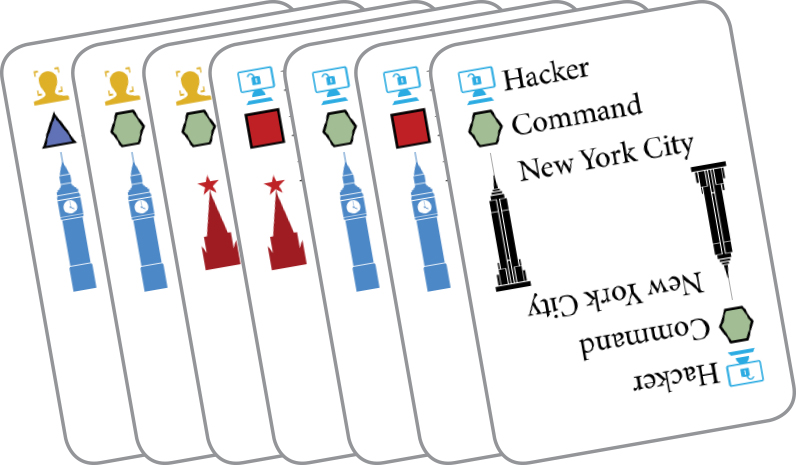Espionage: The Card Game [Prototype G]

This game has been long in-development and kept offline longer than usual, but I think it's finally ready for public playtesting. It's best described as a Gamer's version of Liars' Dice, but with cards instead of dice. It lifts the hot potato elements from Kakerlakenpoker and mashes them all up with a spy theme.
[[DOWNLOAD]]
THE THEME
You are a spy tracker. Employed by your secretive organization, it’s your job to monitor the espionage activity across the world. Keep your sources active, as they’re your best tool for deducing which global actors are in play.
THE GOAL
This is a game of bluffing and deduction. Be the first player to score three points or to be the last player with active Sources.
GAME COMPONENTS
Each card in the game depicts a spy who is either a Face, Hacker, or Muscle; working for either Agency, Bureau, or Command; in either New York City, London, or Moscow. There are nine of each attribute throughout the deck.
Each spy is a unique combination of one role, faction and city, for a total of 27 unique spies. The deck also includes five Mercenaries and four Traitors.
There are also several Source tokens, but these are not mixed into the general deck.
SETUP THE GAME
Each player gets a set of Source tokens. Each Source token is double-sided, showing that they’re either ACTIVE or UNDERGROUND. Everyone’s Sources begin with the ACTIVE side up.
2 Players: Six Sources per player.
3 Players: Four Sources per player.
4 Players: Three Sources per player.
SETUP EACH ROUND
Shuffle the cards into a single deck and deal each player a full hand of cards face-down. The number of cards you can keep in your hand is determined by the number of your active sources. If you have five active sources, your hand limit is five cards.
The most honest player makes the first bid of the game. Thereafter whoever lost the last round makes the first bid. If the loser was eliminated the last round, the winner of the bid makes the first bid. Bidding is explained below.
PLAYING YOUR TURN
On your turn, you may BID, RAISE, CALL or SPOT.
Then choose another player to take the next turn. Turns do not proceed clockwise. You choose who goes next.
BID
Out loud, guess the minimum number of a role, faction or city you think is in all players’ hands. You may not bid a lower number than has been previously stated, but you may bid the same number while changing the role, faction or city.
For example, if the current bid is “At least five spies are hackers,” you could bid “At least five spies are working for Agency,” or “At least five spies are in Moscow.”
RAISE
You may increase the number currently being bid. You may also change the role, faction or city being bid.
For example, if the current bid was “At least five spies are in Moscow,” you could raise “At least SIX spies are in Moscow,” or “At least SIX spies are HACKERS!”
CALL
If you believe the current bid is incorrect (in other words, that there are fewer than stated number of roles, factions or cities) you may say “CALL,” at which point all players reveal their entire hands.
Count how many of that role, faction or city are out there. Any Mercenary cards add to this number. Any Traitor cards subtract from this number.
- If the bid is correct (there are at least that many role, faction or city): One of the Caller’s Sources goes underground.
- If the bid was incorrect: (there are fewer than that many role, faction or city): One of the bidder’s Sources goes underground.
This ends the round. Whoever lost this bid makes the first bid in the next round. If that player was eliminated, then the winner makes the first bid next round.
SPOT
If you believe the current bid is exactly correct, you may say “SPOT,” at which point all players reveal their entire hands.
Count how many of that role, faction or city are out there. Any Mercenary cards add to this number. Any Traitor cards subtract from this number.
- If the Spotter is correct (there are exactly that many role, faction or city): One of the bidder’s Sources goes underground and the Spotter gains 1 point.
- If the Spotter was incorrect: (there are fewer or more than that many role, faction or city): One of the Spotter’s Sources goes underground and the bidder gains 1 point.
This ends the round. Whoever lost this bid makes the first bid in the next round. If that player was eliminated, then the winner makes the first bid next round.
EXAMPLE OF COUNTING AFTER A CALL OR SPOT
ENDGAME AND VICTORY
The player who reaches 3 points or is the last player with active Sources wins!



Comments
Post a Comment